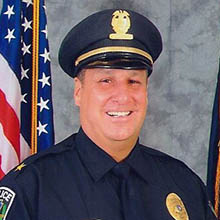
As most of you know, in December 2017 we added a new officer to our South Fayette family: Ellie Faye, the bloodhound of the South Fayette Township Police Department.
The dog has been very active so far, having been certified through the National Houndsmen Association and having endured the rigorous training regimen required to become nationally licensed. Over the past year, Ellie and her handler, Sgt. Mike Wesolek, have been called upon for assistance 14 times to help find runaway juveniles, people with special needs, lost persons and wanted suspects. The big, floppy bloodhound also has enjoyed meeting—and happily slobbering upon—many children and adults at community events.
Within the police department, Ellie has often lifted our spirits as well as those of residents and visitors. Dogs in general have been known to have a tremendous positive effect on people; as the adage goes, they are “man’s best friend.” That’s why dogs around the country have been well suited to assist veterans and police officers who suffer from post-traumatic stress disorder (PTSD) or traumatic brain injury—effectively saving the lives of both the veteran and dog.

Ellie Faye
Pennsylvania in particular has a large per capita population of post-9/11 veterans, and several K-9 programs have assisted veterans and law enforcement officers with the effects of PTSD. The Florida-based charitable organization “K-9s for Warriors,” accredited by the Better Business Bureau, trains service dogs to perform tasks that help quiet the traumatic disabilities faced by some veterans and law enforcement officers. These dogs learn to help with anxiety, depression, isolation and nightmares.
Statistics from the National Institutes of Health, the Department of Defense, Harvard University, Purdue University and Indiana University show that on average, veterans consume up to 14 medications a day to treat PTSD or traumatic brain injury, and police officers are at the top of the list for suicides and alcoholism. This makes me stop and think, “Are we doing enough to assist with these disabilities?”
As a police chief who has the upmost respect and gratitude for the men and women who have served our country in the military, I believe the “K-9s for Warriors” program has greatly assisted with these challenges. The program recently conducted a study with 141 participants, half with a service dog and half without. The study found that depression, PTSD symptoms and anxiety levels were significantly lower among the half who were provided with service dogs.
I am pleased that in our community, Ellie can provide comfort to our officers and joy to our community members.
Professionally,
John R. Phoennik
Chief of Police
South Fayette Township
This post was originally published in November, 2018 at Chief Phoennik’s blog.